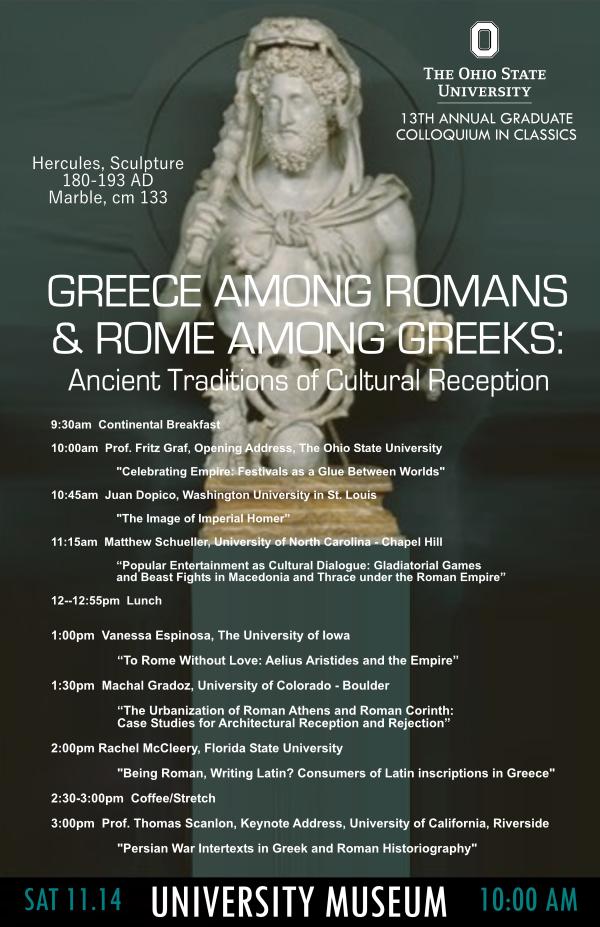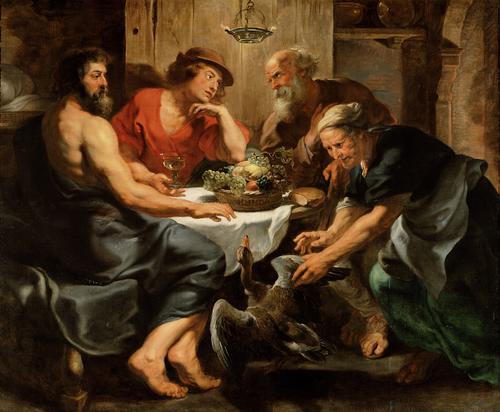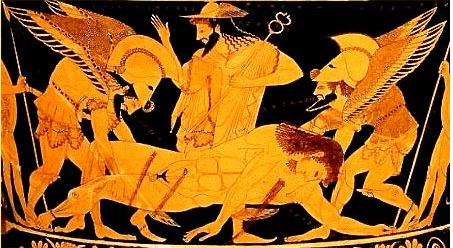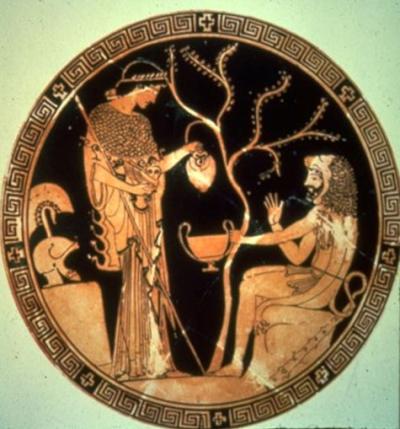Annual Classics Graduate Colloquium
Every year our graduate students put together a colloquium. It is an all day event - sometimes two days - made up of several panels and speakers for each panel.
Previous Colloquiums
A Crucible of Cultures: Cultural Exchange in the Ancient Mediterranean
February 22nd, 2019
Human | Nature: Environmental Humanities in Historical Perspective
March 24th, 2018
What Does Evil Look Like? Horror, Macabre, and Ideological Control throughout the Ancient Mediterranean World
March 25th, 2017
Greeks Among Romans, Romans Among Greeks: Ancient Traditions of Cultural Reception
November 14th, 2015

Walking the Line: Limits and Boundaries in the Ancient World
March 29th, 2014
Keynote Speaker: Charles Platter, University of Georgia
Opening Address: Fritz Graf, The Ohio State University
University Hall Museum, Room 143 - 230 North Oval Mall

"Apollo and Daphne" by Lorenzo Bernini
Schedule of Events
| 9:00-9:30 | Breakfast | |
| 9:30-10:30 | Opening Address | |
| “Their Boundaries and Ours: On Territoriality in Ancient Religions and Modern Scholarship” Fritz Graf, The Ohio State University | ||
| 10:30-11:30 | Panel 1 | |
| "Drawing Lines in Mesopotamia" Hamish Cameron, University of Southern California | ||
| "Communication and Trade across the Indian Ocean in the Early Imperial Period" Charlie Yow, The University of Georgia | ||
| 11:30-1:00 | Lunch | |
| 1:00-2:00 | Panel 2 | |
| "Separating History from Archaeology at Mycenae" Evan Levine, Texas Tech University | ||
| "Concerning the Complexity of Influence on and within the Italic Languages" Jill Simmons, The University of Georgia | ||
| 2:00-2:15 | Break | |
| 2:15-3:15 | Panel 3 | |
| "Nero vs. Nature: The Fateful Crossing of Boundaries in Suetonius' Life of Nero" David Wright, Rutgers University | ||
| "Theocritean narrative framing in Vergil's Aristaeus" Amanda Gregory, University of Wisconsin | ||
| 3:15-3:30 | Break | |
| 3:30-4:30 | Keynote Speaker | |
| "Margins of Text and Genre in Aristophanes" Charles Platter, The University of Georgia |
Hospitality and ? ? ?
March 30th 2013
Mershon Center
1501 Neil Avenue
Columbus, Ohio
Keynote Speaker: Daniel Caner, University of Connecticut
Opening Address: Tom Hawkins, The Ohio State University
Location: Mershon Center at The Ohio State University, Columbus, Ohio

Jupiter and Mercurius in the House of Philemon and Baucisby Rubens
From Odysseus’ famous encounter with Polyphemos to Martial’s Xenia (book XIII), guests and hosts appear frequently in the ancient world. More recently, scholars have explored the role hospitality may play in less obvious ways, such as the potential for hospitality presented by itinerant sophists (Tell, 2011). The concept of hospitality deserves serious attention, in part because it offers an entry point—an invitation—to exploring other concepts such as reading practices, monastic orders, gift-giving, and citizenship. We invite you to add to the scholarly discussion of hospitality in the ancient world by relating it to other times, concepts, texts, and contexts.
Schedule of Events
| 9:00-9:30 | Coffee and Bagels | |
| 9:30-10:15 | Opening Address | |
| “Let the Right One In” Tom Hawkins, The Ohio State University | ||
| 10:15-10:45 | "Blood for Speech: Aspects of Exchange in Odyssey 11" Dwayne Meisner, University of Western Ontario | |
| 10:45-11:00 | Coffee Break | |
| 11:00-11:30 | "Thinking Theoxenia" Rachel Sotos, Fordham University | |
| 11:30-12:00 | "Piracy: Cause of Hospitality" Aaron L. Beek, University of Minnesota | |
| 12:00-1:30 | Lunch | |
| 1:30-2:00 | "Exported Sons: Hospitality and Adoption in the Roman and Sasanian Empires" Jacqueline Arthur-Montagne, Stanford University | |
| 2:00-2:30 | "On the Road with the Byzantines: Inns and Travelers in the Seventh, Eighth, and Ninth Centuries" Jason Fossella, Saint Louis University | |
| 2:30-3:00 | Coffee Break | |
| 3:00-4:00 | Keynote Speaker | |
| "No Respector of Persons: Monastic Hospitality and Notions of Equality in Early Byzantium" Daniel Caner, University of Connecticut |
Chosen Chains: Creating Loyalty in the Ancient World
April 21st, 2012
The Mershon Center
Keynote Speaker: David Konstan, Brown University
Loyalty, like love, can be driven by a range of motivations: an emotional experience, the desire to maintain tradition, or practical self-interest. In the ancient world, loyalty to family and state are presupposed as static and near-universal values of which famous instances are employed as models for other loyalty-relationships. Yet even the claims that family and the state could make upon their members are not self-evident. How did these institutions maintain their claim and react to changing circumstances? How, more generally, did individuals and institutions establish and maintain their roles as objects of loyalty? Did they look to traditional models, or did they frame their claims in opposition to them? Can we see repeated patterns or common strategies either in the historical record or in literary accounts?
The aim of this colloquium is to investigate the creation of loyalty in the ancient world by examining the recurring patterns of action and language that surround the establishment of these bonds. It will pursue this theme through two distinct avenues: lived loyalties as we can access them through the historical record and literary representations which pose questions about the nature and creation of loyalty. Historically, how did the development of loyalty work within and between societal groups, for example in the foundation documents that established relationships between colonies and mother cities? How did Roman military leaders encourage loyalty from their troops? How did ancient imperial powers like Rome and Athens attempt to create loyalty in the people they governed? Did cults like those of Isis or Cybele develop a following among the Roman population by working themselves into the traditional language of loyalty or by emphasizing their supposed foreignness?
Likewise, we are interested in exploring how ancient authors conceptualized, portrayed, and made use of the creation of loyalty. How did authors use moments when bonds of loyalty are created – or fail to materialize –to characterize figures in their works or to comment upon broader themes? How do Livy’s Sabine women model the character he imagines for his Rome? Can the elegists be said to undertake a claim of loyalty upon their puellae and, if so, how do these claims, regardless of their validity, help to construct the poet's elegaic persona? Did early Christian communities frame their rejection of pagan culture in terms of loyalty and, if so, how and to whom?
Please address any questions to Hanne Eisenfeld or Marion Kruse
Writing the Past
Fact and Fiction in Ancient Historiography
Keynote Speaker: John Marincola, Florida State University
“Indeed, history, so it has been contended, needs to be as convincing as fiction”
- Ronald Syme, “Fictional History Old and New: Hadrian”
Schedule of Events
| 8:45-9:30 | Breakfast | |
| 9:30-10:30 | Opening Address | |
| "Why Latin Historiography: On Some Uses and Abuses of History in the Republic" William Batstone, The Ohio State University | ||
| 10:30-11:30 | Panel 1 | |
| "Epinikios Historiē“: The Importance of Pindar and Poetic Pleasure for Herodotus' Inquiry" Matt Simonton, Stanford University | ||
| "When you have to tell a lie, tell it': Herodotus and Darius' Bisitun Inscriptions" Nicholas Geller,University of Michigan | ||
| 11:30-1:00 | Lunch | |
| 1:00-2:00 | Panel 2 | |
| "Myth and History's Audience in Thucydides' Peloponnesian War" Sarah Miller Esposito, University of North Carolina, Chapel Hill | ||
| "Cicero's Epistolary Brundisium" Virginia Closs, University of Pensylvania | ||
| 2:00-2:15 | Coffee Break | |
| 2:15-3:15 | Panel 3 | |
| "Ovid's Fact-Making Fictions" Nandini Pandey, College of Wooster/Univeristy of California Berkeley | ||
| "Valerius Flaccus, Historian: The Ends of Ovid and Lucan in the Argonautico" Leo Landrey, Brown University | ||
| 3:15-3:30 | Coffee Break | |
| 3:30-4:30 | Keynote Speaker | |
| "Did the Greeks and Romans Believe in Their Histories?" John Marincola, Florida State University |
Please direct any questions to Mark Wright or Corey Hackworth
Post Scriptum?
Questioning the Status of Greek and Latin Literature in Late Antiquity
Keynote Speaker: Gavin Kelly, University of Edinburgh
Saturday, April 17, 2010
George Wells Knight House
104 E. 15th Avenue
Schedule of Events
| 9:00-9:30 | Coffee, Bagels, and Conversation | |
| 9:30-10:15 | Opening Address | |
| "Things are more like they are now than they ever have been: The Belatedness of Late Antiquity" Anthony Kaldellis, The Ohio State University | ||
| 10:15-10:45 | "Headed to Hell in a Handbasket: Depictions of Tartarus in Early Christian Hymns" Robin McGill, Brown University | |
| 10:45-11:00 | Coffee Break | |
| 11:00-11:30 | "The Sword, the Spear, and the Stylus: Procopius and Military Historiography" Charles Bartlett, New York University | |
| 11:30-12:00 | "Cosmological Civic History from Plato to Augustine: Timaeus-Critias and City of God 11-22" David DeVore, University of California - Berkeley | |
| 12:00-1:30 | Lunch | |
| 1:30-2:00 | "Exigua Monumenta: Secondary Poetics and the Late Antique Verse Summaries of Vergil's Aeneid" Christopher Polt, University of North Carolina | |
| 2:00-2:30 | "Textus Sacrilegus: The De Raptu Proserpinae and the Construction of Latin Poetry" Aaron Pelttari, Cornell University | |
| 2:30-3:00 | "Days of Future Past: Quintus of Smyrna on Past and Present" Vincent Tomasso, Stanford University | |
| 3:00-3:30 | Coffee Break | |
| 3:30-5:00 | Keynote Speaker | |
| "Writing the History of Later Latin Literature" Gavin Kelly, University of Edinburgh |
The Future of the Ancient: Making Classics Relevant
Saturday, May 2, 2009
Keynote Speaker: Mary Beard
Location: George Wells Knight House
Contact: teitel-paule.1@osu.edu or danielewicz.1@osu.edu
Schedule of Events
| 9:00-9:30 | Coffee | |
| 9:30-10:15 | Opening Address | |
| "Brave New Ancient World" Bruce Heiden, Ohio State University | ||
| 10:15-10:45 | "Were the Classics Ever Relevant?" Marcos B. Gouvea, University of Chicago | |
| 10:45-11:15 | "On Poets and Poetry: The Anxieties of Poetic Reception in Callimachus' Epigrams" Sophia Bender, Columbia University | |
| 11:15-11:30 | Coffee Break | |
| 11:30-12:00 | "The Deviation of the Standards: The Classics in Secondary Education" Erin O'Bryan, University of Pittsburgh | |
| 12:00-12:30 | "The Homeric Ethos Experiment: The Modern Struggle to Be the Best of the Achaeans" Emily Joy Bembeneck, Matthew Cohn, Jonathan M. Rowland, University of Michigan | |
| 12:30-1:30 | Lunch | |
| 1:30-2:00 | "Canon Balls: Rethinking the Conditions of Reading Latin Texts" Ian Fielding, University of Warwick/UW-Madison | |
| 2:00-2:30 | "Computer Technology and Textual Criticism" Harry Schmidt, University of Princeton | |
| 3:00-3:30 | "Teaching Classics and American Identity: A new angle on the 'relevance' of Greco-Roman antiquity" Lyra Monteiro, Brown University | |
| 3:30-3:45 | Break | |
| 3:45-5:15 | Keynote Speaker | |
| "Does Classics Have a Future?" Mary Beard, Cambridge University |
Imitation and Innovation:
Mimesis in the Ancient World

April 5, 2008
Coordinators
Steve Maiullo
Katarzyna Jazdzewska
Opening Speaker
Richard Fletcher (The Ohio State University)
Keynote Speaker
Tim Whitmarsh (Corpus Christi College, University of Oxford)
Graduate Student Participants
James Brusuelas (University of California Irvine)
Edward Dandrow (University of Chicago)
John Oksanish (Yale University)
Anna Peterson (The Ohio State University)
Seth Phipps (Magdalen College, University of Oxford)
Emily Pillinger (Princeton University)
Schedule of Events
| 9:00-9:30 | Coffee and Conversation | |
| 9:30-10:15 | Opening Speaker | |
| “Represent! Facing the Demands of Mimesis” Professor Richard Fletcher, The Ohio State University | ||
| 10:15-10:45 | “Mediating Medea: Dramatic Representation and the Politics of Poetic Reference in Cicero’s Pro Caelio” Edward Dandrow, University of Chicago | |
| 10:45-11:00 | Coffee Break | |
| 11:00-11:30 | “A Rhetoric for the Principate: Vitruvius’ Architectura Scripta” John Oksanish, Yale University | |
| 11:30-12:00 | “Carmenque timent audire secundum (Lucan B.C. 6.528): The Intra-textual Tradition of Poetic Witchcraft“ Emily Pillinger, Princeton University | |
| 12:00-1:30 | Lunch | |
| 1:30-2:00 | "Paradigm, Mimesis and Generic Innovation in the Late Classical and Hellenistic Greek Epigram” Seth Phipps, Magdalen College/University of Oxford | |
| 2:00-2:30 | “Between Comedy and Metacomedy: Lucian, Aristophanes, and The Dream” James Brusuelas, University of California Irvine | |
| 2:30-3:00 | “Everybody Must Get Stoned: Parrhesiades as Dikaiopolis in Lucian’s Fisherman” Anna Peterson, The Ohio State University | |
| 3:00-3:30 | Break | |
| 3:30-5:00 | Keynote Speaker | |
| “Mimesis, Hellenism, and the other” Professor Tim Whitmarsh, Corpus Christi College/University of Oxford | ||
| 5:00-6:00 | Reception |

The Many Faces of the Gods
Examining Conceptions of Divinity in Antiquity
Keynote Speaker: Jan Bremmer, University of Groningen
April 7th, 2007
George Wells Knight House
104 East 15th Avenue
Schedule of Events
| 9:00-9:30 | Coffee and Conversation | |
| 9:30-10:15 | Opening Speaker | |
| “Where the Hell Did Their Gods Come From? – Rethinking the Multicultural Background of Greek Mythology Professor Carolina López-Ruiz, The Ohio State University | ||
| 10:15-10:45 | “(Mis)Perceiving the Divine or Did Lucius Really See Isis?” Michael Vincze, Boston University | |
| 10:45-11:00 | Coffee Break | |
| 11:00-11:30 | “Anthropomorphism and Ignorance” Bridget Buchholz, The Ohio State University | |
| 11:30-12:00 | “Varro in Augustine and Augustine in Varro: An Episode in the Genealogy of ‘Religion’” Brent Nongbri, Yale University | |
| 12:00-1:30 | Lunch | |
| 1:30-2:00 | “A Multitude of Perspectives: Domestic Display and Religious Interactions in Late Antique Aphrodisias” Ian Michael Lockey, New York University | |
| 2:00-2:30 | “Willing and Unwilling: The Relationship between Heraclitus and the Gods” Andrew Barrett, Wayne State University | |
| 2:30-3:00 | “I Will Not Pour Out the Cedar Oil: Coercing the Gods in P. Mich. 534” Richard Persky, University of Michigan | |
| 3:00-3:30 | Coffee Break | |
| 3:30-5:00 | Keynote Speaker | |
| “Hephaestus: The Construction of a Marginal God” Jan Bremmer, University of Groningen | ||
| 5:00-6:00 | Reception |
Identity and Identifications
Cultural Politics in the Ancient World
Keynote Speaker: Thomas Habinek, University of Southern California
Saturday, April 15, 2006
George Wells Knight House
104 East 15th Avenue
Schedule of Events
| 9:00-9:30 | Coffee and Conversation | |
| 9:30-10:30 | Session I | |
| "How Am I Not Myself?: The Poetics of Identity in Targets of Invective Abuse" Tom Hawkins, The Ohio State University | ||
| "Remembering the Future: Aeneas between Troy and Rome" Mathias Hanses, Ball State University | ||
| 10:30-10:40 | Coffee Break | |
| 10:40-12:10 | Session II | |
| "Crossing Troy: Helen and the Poetics of Metaphora" Katerina Ladianou, The Ohio State University | ||
| Seminar: "Mapping the Female Subject in the Early Roman Empire" Denise Eileen McCoskey, Associate Professor in Classics and Affiliate, Black World Studies Miami University | ||
| 12:10-1:30 | Lunch | |
| 1:30-3:00 | Session III | |
| "Our Own Selves or Somebody Else's: The Contest of Identity in Plautus" Christopher Bungard, The Ohio State University | ||
| "Arrian the Personal Historian" Kyle Lakin, Stanford University | ||
| "The Orthodox Politeia and the Syriac Life of John of Tella" Nathanael Andrade, University of Michigan | ||
| 3:00-3:30 | Break | |
| 3:30-5:00 | Keynote Speaker | |
| "Imitation and Address in Ancient Societies" Thomas Habinek, University of Southern California | ||
| 5:00-6:00 | Reception |
